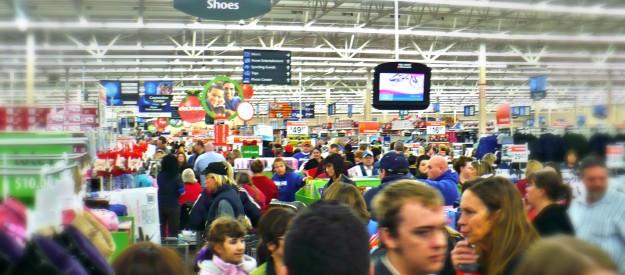"We are losing our attitude of wonder, of contemplation, of listening to creation and thus we no longer manage to interpret within it what Benedict XVI calls 'the rhythm of the love-story between God and man.'"
+ Pope Francis
Let's not forget the consumer

There’s an irony to the timing of COP climate talks: Each year they take place during the Christmas shopping season, when frantic consumption in much of the world takes its toll on the planet.
The census bureau here in the States compiled some numbers from 2010 that tell us a few things: Retail sales by the nation's department stores jumped 44 percent from November to December to some $27.2 billion—which is about what happens every holiday shopping season.
In specific retail areas, electronics stores saw a 44 percent increase; sporting goods jumped 58 percent; bookstores 92 percent; and jewelry store sales spiked at 113 percent.
Now think about the supply chains that make all this possible: the conflict minerals that make our electronics cheap and plentiful; the factories that may not have the best environmental and labor practices; the conflict or blood diamonds, to name a few. And let's not forget the energy it takes to extract all the resources for these products, and to assemble them, and get them to your homes.
On the other end of the consumption chain comes an excess of garbage for disposal. Landfills in the United States, for instance, typically see a 25 percent jump in tonnage from Thanksgiving until the New Year.
Then there’s the social consequences of wanting too much stuff, as we see especially on “Black Friday,” the much-hyped shopping orgy on the day after Thanksgiving.
Mind you, all this is happening while the world is looking to government and business to control consumption.
Here's a thought: Perhaps we're looking at the wrong side of the equation.
We need only look to our faith to see why we individual consumers drive much of the eco-woes of our age. The link between consumption and human suffering is the main imagery of Genesis 3. Adam and Eve ignore the only divine prohibition they'd been giving and opt instead to grasp for, acquire, and consume the fruit of the Tree of Knowledge of Good and Evil. And thus they quickly know evil—personally and painfully—with the severing of humanity’s relationship with God, nature, and each other.
In an ordered cosmos, choices come with consequences.
The problem is, the propensity of our first parents to grasp, acquire, and consume all that we should not consume remains embedded within us—I certainly know that from personal experience.
The other problem is that marketing firms know how to exploit our desires—especially those that cry out from the deeper wounds of our shattered and lonely souls.
But God's grace is stronger than both our desires and the ploys of advertising experts. His grace is sufficient for the virtue we all need to consume less of the goods of this world and instead seek the things of the next. And there are lots of ways to change what and how much we buy.
What all this means for Catholic ecologists is that the answers to our eco- and climate woes are not merely found in agreements among governments. Rather the answers rise out of the sacramental grace of God that takes root in human activity and thus alters it, elevates it, while transforming us from seeking self-centered consumption at all costs to living lives of sacrificial self-giving love of God, neighbor, and creation.
Photo: Flicker/Laurie


















